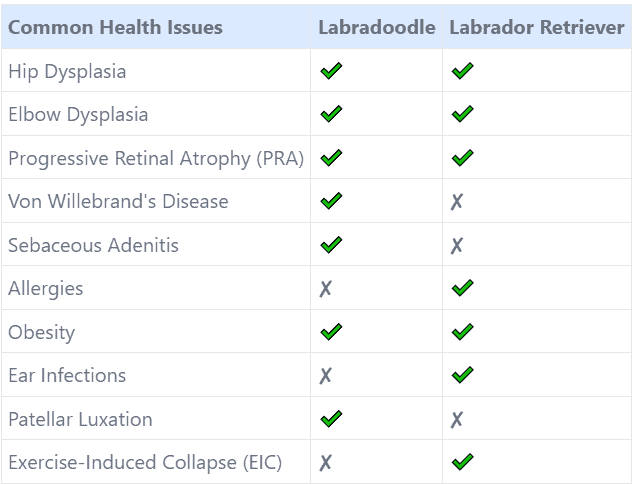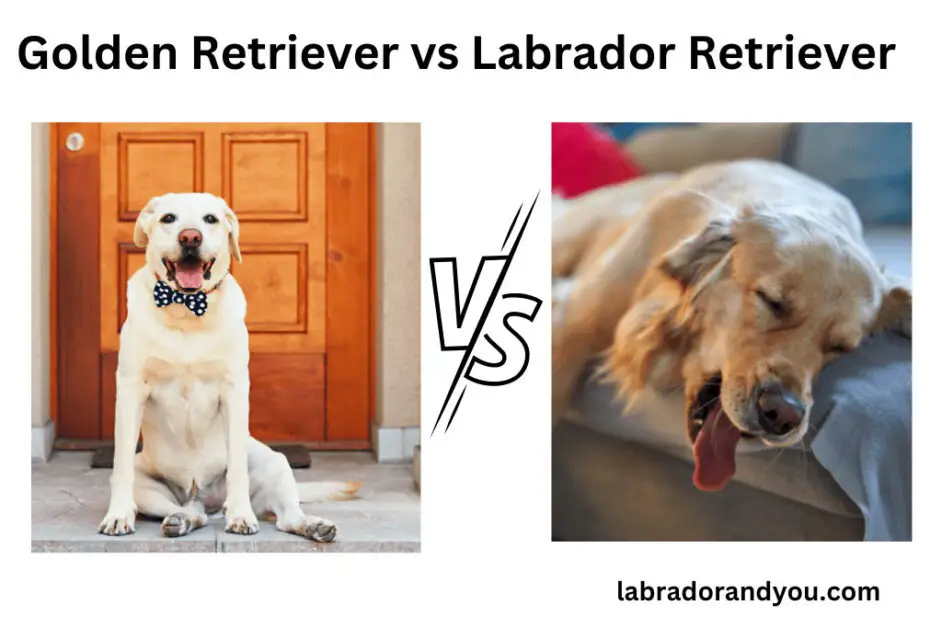While Labrador Retrievers are purebred dogs with predictable traits ideal for service and hunting, Labradoodles are a popular mixed breed gaining fame as family pets and guide dogs. Labradoodles tend to shed less with more hypoallergenic coats. However, their appearance and temperament can vary as they are not selectively bred.
Labradors excel at tasks like retrieving, thanks to their high energy and intelligence. With moderate grooming needs and an affectionate yet playful nature, Labradoodles can thrive as active family pets.
Those looking for consistency may prefer Labradors, while Labradoodles offer the best of their parent breeds. Ultimately, the choice depends on lifestyle and personal preference.

Origins And Breed History
Labradoodle dogs can be traced back to Australia in the 1980s. Breeder Wally Conron first combined a Labrador Retriever with a Standard Poodle.
He aimed to create a hypoallergenic guide dog for people with allergies or sensitivity to dog hair. The result was an intelligent and trainable hybrid breed quickly gaining popularity.
Labs have existed since the 19th century in Newfoundland, Canada. They were initially bred there for hunting and retrieving purposes. They have been the most popular dog breed till 2023.
These strong swimmers are skilled at retrieving ducks from frigid waters and assisting fishermen by hauling nets. They make awesome assistance dogs.
Labrador temperament:- Their stamina, intelligence, and gentle nature make Labradors one of America’s most popular dog breeds.
Labradoodle vs Labrador: Physical Traits And Personality
Labradoodles and Labs are friendly, outgoing dogs that make great family pets. However, their physical traits and overall personalities differ in critical ways. Labradors tend to be larger than Labradoodles. The standard size weighs between 55-80 pounds. Labradoodles can range from 15-65 pounds, depending on the size of the Poodle parent.
Labradors also have short hair coats in black, yellow, or chocolate colors. Labradoodles have wavy or curly hair coats. They can be solid-colored like a Poodle or retain some retriever-like color patterns.
Both breeds are affectionate, loyal companions who thrive on human interaction. Labs are more energetic and require plenty of exercise due to their hunting instincts. They love retrieving games and swimming!
Labradoodles are generally calmer yet playful dogs. They enjoy walks and playing with toys indoors. Both breeds are intelligent and trainable, but remember, as first-time dog owners, that being consistent is crucial for obedience training success!
Labradoodle Dogs vs Labrador: Coat Types And Grooming Needs
Labradoodles and Labrador Retrievers have different coat types and grooming needs. Labradors have a short, dense, water-resistant double coat that requires minimal grooming. These purebred dogs shed their fur moderately throughout the year. Heavier shedding is noticed during spring and fall.
The labradoodle breed can have a curly or wavy single coat. It is low-shedding and potentially hypoallergenic. This type of coat also requires regular brushing to prevent matting.
Both breeds require regular bathing and nail trimming as part of basic care. Labradoodles may need more frequent professional grooming appointments due to their unique coats’.
While some breeders advertise “hypoallergenic” Labradoodles or Labs with non-shedding coats, there is no guarantee. These dogs may still cause allergies in sensitive individuals.

Labradoodle vs Labrador: Energy Levels And Exercise Requirements
Labradors are a sporting breed that requires at least 30 minutes to an hour of daily exercise, like playing fetch or long walks.
Without proper exercise, a Labrador Retriever may become bored and destructive. Labradoodles have a moderate energy level. They are suitable for families who want an active dog but do not have the time or space to provide extensive daily exercise routines.
They require regular walks and playtime but can also enjoy indoor activities such as puzzle toys or training sessions. Consider your lifestyle and ability to provide adequate physical activity. A Labradoodle might be better if you cannot commit enough time due to its lower energy needs.
Labradoodle vs Labrador: Intelligence And Trainability
Regarding intelligence and trainability, both Labradoodles and Labrador Retrievers score high marks. They are known for being quick learners and eager to please their owners.
The Poodle ancestry of Labradoodles often gives them an edge in this category. Poodles are among the smartest dog breeds out there. Labradors have been trained for centuries as working dogs. This makes them highly trainable, too but a bit ‘free-spirited.’
Labradoodles show great cognitive abilities when trained through positive reinforcement. These designer dogs respond well to clickers or reward-based methods.
Health And Care Comparison: Labradoodle Labrador Retriever
Labradoodles and labradors have slightly different health concerns. But both breeds are prone to hip dysplasia. Obesity is more common in labradors, and ear infections are more frequent in Labradoodles.
Labradors tend to overeat and should be fed a well-balanced diet with regular exercise. Labradoodle owners must monitor their dog’s food intake due to the risk of bloat (gastric torsion) from eating too quickly.
Common Health Issues Of Labradoodles And Labrador Retriever
Here’s a comparison of the common health issues for both Labradoodles and Labradors:

Nutrition And Diet Variations:
Labradoodles and Labradors have unique nutritional and dietary needs. It is influenced by their breed, size, energy levels, and health conditions. Here is a table comparing the nutritional and dietary differences between Labradors and Labradoodles:
| Aspect | Labrador Retriever | Labradoodle |
|---|---|---|
| Caloric needs | High (1200-1500 cal/day) | Moderate (800-1200 cal/day) |
| Food type | Best quality kibble, high in protein and fat | Quality kibble, moderate protein and fat |
| Portion size | 3-5 cups per day for adults | 2-3 cups per day for adults |
| Treats | Limit due to obesity risk | Can have more treats |
| Allergies | Rare | Higher risk – avoid chicken, beef, wheat |
| Grooming | Shed heavily year-round | Moderate shedding, requires brushing |
| Exercise needs | Very high | Moderate |
Training Needs
Labradoodles tend to have a higher level of intelligence due to their Poodle lineage. Consistent training is important for both breeds from an early age. Learning basic obedience commands like sit, stay, come when called, etc., makes life easier for everyone involved!
Life Expectancy
Both the labrador retriever and labradoodle are large dog breeds. It means they leave a few years less than small breeds. A healthy labrador retriever has a life expectancy of 10-12 years, with an average of 11. A labradoodle lives about 12-14 years with an average of 13.
Choosing The Ideal Breed For Your Lifestyle
Find out more about which dog breed fits your lifestyle in this ultimate comparison guide!
Considerations For Active Vs. Laid-back Lifestyles
When choosing between a Labradoodle and a Labrador, you must consider your lifestyle and how much activity you can provide.
1. Active Lifestyle:
– A Labrador may be the better choice if you’re active and enjoy spending time outdoors.
– Labradors have high energy levels and require at least an hour of exercise daily.
– They love to swim, run, hike, and play fetch.
2. Laid-back Lifestyle:
-A Labradoodle could be the perfect companion if you prefer a more laid-back lifestyle with less physical activity.
– They still require daily walks to stay happy and healthy dogs.
– They enjoy playing but are also content with snuggling up on the couch for quality bonding time.
3. Combination of both lifestyles:
– Both breeds can adapt well to your needs if you enjoy an active, laid-back lifestyle.
– A Labrador can join for morning jogs or weekend hikes while also appreciating curling up on the couch in the evening.
– A Labradoodle can participate in family activities during the day but still be comfortable relaxing inside in the evening.
Matching Personality
Labs are family-friendly dogs known for being loyal, playful dogs who thrive in social situations and home life. Labradoodles tend to be more reserved around strangers but affectionate towards family members once familiarized.These personality differences can help decide which dog breed best suits your household and lifestyle needs.
Availability And Cost Factors
Know which dog breed is easily accessible in your location and their market price. Generally, a purebred Labrador Retriever is more widely available than Labradoodle. Finding reputable breeders can also affect accessibility.
Labradoodles can be pricey due to their popularity and demand. However, a Labradoodle’s average price is higher than a Lab’s.
It is because of its mixed breed status, breeding process (usually requiring artificial insemination), and potential hypoallergenic qualities.
Adopting or rescuing either breed may offer an affordable alternative. Do not select based on price alone but on compatibility with your lifestyle and preferences.
Labradoodle Or Labrador Retriever: Which Is The Best For You?
Labradoodles and Labradors have unique strengths and qualities, making them excellent companions. Whether you choose a Labradoodle or a Labrador, both breeds make wonderful additions to any family.
There is no single answer to the labradoodle vs labrador retriever showdown. The battle between America’s favorite purebred dog and favorite hybrid dog breed is tight. Pick the one that suits your needs and lifestyle bets.
FAQs:
1. Do Labradoodles ever calm down?
Labradoodles usually calm down when around three years old. Each puppy experiences a unique hyperactivity phase that slows down gradually. It is an intelligent breed that quickly learns what is wrong and right.
2. Which breed is better suited for families with children?
Both breeds make great family pets. Since poodle parents can be a little wary, a labradoodle acts strange around unfamiliar people and animals. If you are looking for energetic dogs who are the best all-around family pets – Labrador retriever can’t be beaten!
Labradors are registered according to the American Kennel Club. Look for an AKC-registered lab from your breeder. Choose from AKC-recognized coat colors.
3. Are Labradoodle dog breeds ever aggressive?
Aggression is the last thing to bother regarding a Labradoodle. They do not have a dangerous nature. These dogs are sweet and friendly with children and other pets.
4. Do Labradoodles live longer than Labradors?
Depending on the size, the average life expectancy of a labradoodle is 12-14 years. A Labrador retriever and a poodle are expected to live about 12 years. A standard labradoodle has a typically shorter lifespan of around 12 years.
5. Can Labradoodles be left alone?
You can occasionally leave an adult labradoodle alone for up to 8 hours. A puppy under six months must not be left alone for more than 2 hours. A labradoodle puppy is not an ideal choice for busy lifestyles.
6. Who has a better temperament – A labradoodle male or female?
Both male and female Labradoodles are incredibly sweet and active. There is no significant difference between them. A slight change in personality traits can occur with age. There is nothing that will make dog owners prefer one over the other.
7. What is the cost of a labrador retriever labradoodle?
A purebred labrador puppy costs between $ 800 and $ 1200. Besides, labradoodle puppy prices range from $ 1500 to $ 3000 +. It varies based on sex, poodle parent quality, region, etc.
Author Profile

- Lifetime dog Enthusiast
- Shradha is a seasoned writer at Labradorandyou.com, an authoritative resource for all things Labrador Retriever. Her experience as a pet owner and dog enthusiast drives her to create meticulously researched and fact-checked content, offering valuable insights on Labrador training, grooming, and health. Each article reflects Shradha's passion and dedication, enriched by personal experiences with her beloved Labradors, Tom, and Kurt. Whether exploring breed-specific training techniques or providing product reviews, Shradha ensures Labrador owners receive the most accurate, up-to-date, and trustworthy information, aimed at enhancing their companions' health and happiness
Also by the author
-
 Lab-TypesJuly 12, 2025Скачать Мостбет а Андроид, Официальное Приложение Бк
Lab-TypesJuly 12, 2025Скачать Мостбет а Андроид, Официальное Приложение Бк
-
 Lab-TypesJuly 12, 2025Проверенные Онлайн Казино В Казахстане С Выводом денежек На Тенге 2025
Lab-TypesJuly 12, 2025Проверенные Онлайн Казино В Казахстане С Выводом денежек На Тенге 2025
-
 Lab-TypesJuly 12, 2025Mostbet Brasil: Internet Site Oficial, Inscrição, Bônus 15 000r$ Entrar
Lab-TypesJuly 12, 2025Mostbet Brasil: Internet Site Oficial, Inscrição, Bônus 15 000r$ Entrar
-
 monobrendJuly 12, 2025“posido Casino: Ασφαλές Παιχνίδι, Πλούσια Επιλογή Παιχνιδιών Και Vip Ανταμοιβές Από Το 2022
monobrendJuly 12, 2025“posido Casino: Ασφαλές Παιχνίδι, Πλούσια Επιλογή Παιχνιδιών Και Vip Ανταμοιβές Από Το 2022





